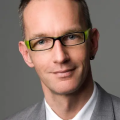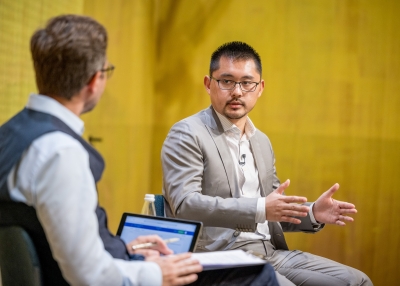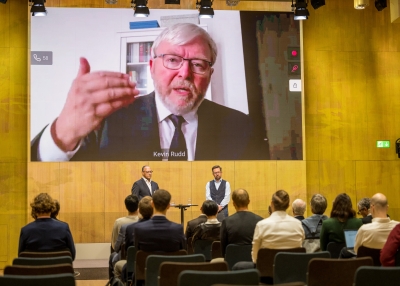Episode 2: Heat and Health
The Impact of Climate Change on the Indian Subcontinent
ZURICH, October 25, 2021 — Mitali Chatterjee, insurance research specialist at the Swiss Re Institute in Bengaluru, India; and Bernd Wilke, senior risk manager at Swiss Re Zurich, discuss how India’s government can deal with the challenges caused by increasing heat across the Indian subcontinent. The episode is moderated by Richard Francis, senior business development manager at Swiss Re Institute, and is part of Climate Change in the Indo-Pacific, a four-part series by Asia Society Switzerland and Swiss Re Institute exploring the effects of climate change in the Indo-Pacific and the world. (1 hr., 1 min., 53 sec.)
Our key takeaways
Dire implications of climate change in India
India and its neighbouring countries have been, and will increasingly experience severe weather events including floods, drought and heatwaves that have a notable impact on the economy and livelihoods. Mitali Chatterjee reports that the erratic nature of rainfalls in India has gone up noticeably. Droughts and floods, as well as heatwaves and humidity, increase the spread of diseases. The world will become dryer and warmer and with this, disease and health patterns will evolve – an estimated 1.2 million people in India could lose their lives by 2030/50 due to extreme heat.
The problem of water
Less snow in the Himalayan region implies that the glaciers will shrink, thus providing less water to the rivers and negatively affecting agriculture – a particularly problematic implication as a large amount of the Indian population is reliant on agriculture. At the same time, clean drinking water is needed to combat health issues, but people will increasingly struggle to access it.
Extreme weather events as the "new normal"
Bernd Wilke explains that we are to expect the strongest impact of climate change in the globe’s most populated circle (with the centre of this circle being Singapore), and that we will also see more extremes – what happened this summer, including fires and floods in Europe, is becoming the new normal. The biggest concern is that natural catastrophes are often linked to health emergencies – the question is how we can adapt to, and combat, these challenges.
Financial resources are key to improving health (care)
Both experts agree that one key factor in improving health and climate change related issues combined is financial resources. Wilke is an advocate for corporates to play a central part, and that a slight development on their side can make a significant change to people of low-income. On the other hand, Chatterjee argues that it is a multi-stakeholder issue and that individuals also have a role to play. Wilke states that we must acknowledge that a huge amount of money will need to be rolled out, but that at the same time, creative thinking in this area needs to become the new ‘business as usual’, as he puts it. A structural shift is very much needed: too few people in India can afford proper healthcare, and Chatterjee highlights that 16 million people will likely fall into poverty because of the financial burden of having to pay their medical bills. Hence, inequalities reinforced by climate change urgently need to be reduced. Spending about 1% to 2.5% of India's annual GDP on health (care) could already make a substantial difference. Also, the insurance sector is in a position to respond to the issues caused by global warming on human health.
Contributed by Gen A 2021 Alumna Eléonore Aubry

Mitali Chatterjee
Insurance Research Specialist Swiss Re Institute, Bengaluru, India
Mitali Chatterjee is an Insurance Research Specialist on Asia, based at the Swiss Re Institute's India branch. She was previously at Deloitte in their Centre for Government Insights and also a part of the Accenture Public Sector thought leadership team. Mitali has researched extensively on public health services and related skill development within the Indian workforce.
She recently published studies with regard to mental health in a post pandemic environment and is part of discussions on the impact of climate change in the Indian context. Particularly, in terms of the role of insurance in ensuring a resilient and sustainable Indian healthcare system.

Bernd Wilke
Senior Risk Manager at Swiss Re
Bernd Wilke is Senior Emerging Risk Manager at Swiss Re looking at the risks in the future for the insurance industry and beyond.
He is an expert on environmental issues, the human factor and sustainability and is currently one in a team of four looking at the top sustainability risks in Swiss Re. He worked for over twelve years as a Risk Engineer and afterwards five years as a Top Topic Manager for Swiss Re in communications.
In these functions he developed risk assessment methodologies for different industries, including the oil and chemical sectors, assisted in the environmental liability area of emerging risk, was part of the team that developed forward looking modeling in casualty and provided support to the company's claims units. In addition he worked extensively on sustainability issues worldwide. After taking some time off to travel in South America he rejoined Swiss Re as Top Topic Manager combining his experience with science journalism and risk communication.
Before joining Swiss Re he worked for Geotech, Inc. in Japan. He holds a Master's Degree in Physical Geography from the University of Basel in Switzerland and a Certificate in Science Journalism from the Swiss Journalism School in Luzern.

Richard Francis
Senior Business Development Manager, Swiss Re Institute
Richard Francis is an international business development expert, currently contracted with the Swiss Re Institute on projects in China. He served as a Trade and Investment Commissioner at the Australian embassies to India and Russia and is fluent in Mandarin and Russian. He was the former Head of China Engagement at the Swiss Re Institute. Richard has wide experience in international higher education as the China Campus Dean of French business school SKEMA, Director of the Curtin University's Asia Business Research Centre in Australia and the Corporate Development Director of Greater China, CEE and CIS at leading Swiss business school IMD.

